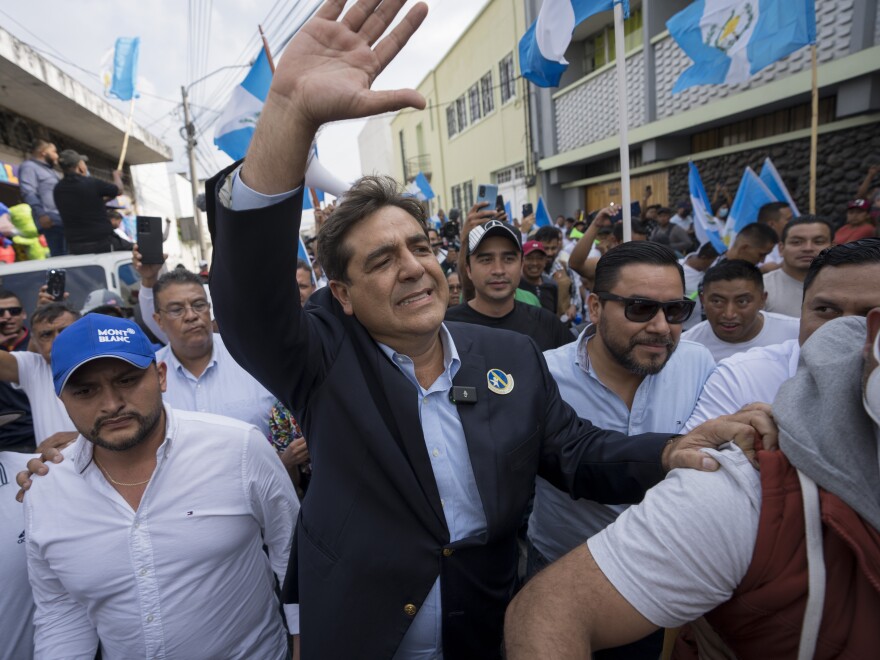GUATEMALA CITY — Voters in Guatemala will take to the polls on Sunday to elect a new president, vice president and Congress. With almost two dozen presidential candidates to pick from, a runoff is almost inevitable.
And despite so many candidates, voters are apathetic.
Here are three things you should know.
The most popular candidates aren't even on the ballot
This election cycle has been shambolic in Guatemala. Three of the country's most popular presidential candidates have been declared ineligible to run in court decisions widely seen as political.
Thelma Cabrera, the leading Indigenous candidate, was expected to be a major contender. But earlier this year, Guatemala's election tribunal threw out her candidacy, saying her running mate had not produced a document showing a clean criminal and financial record.

Last month, that same court found that the party of Carlos Pineda, a populist candidate who had come out of left field to lead the polls, had not followed proper procedures to nominate him as its candidate. The court threw out his candidacy, leaving the path wide open for one of the establishment candidates to ascend to the presidency.

Roberto Arzú, a popular right wing candidate, was barred from the ballot for a similar technicality: he had an outstanding fine from the 2019 campaign and he was sanctioned for campaigning too early for the 2023 election.
At the moment, leading candidates are two infamous politicians: Zury Ríos is the daughter of former president and convicted genocider Gen. Efraín Ríos Montt, and Sandra Torres is a former first lady who had been jailed over charges of corruption.
"The problem in Guatemala is that we don't have a rule of law anymore," says Carlos Mendoza Alvarado, a political analyst in Guatemala City. And that's a huge reason why he expects a record-low turnout.
Apathy reigns
Guatemalan democracy is at a critical moment. Just 17% of Guatemalans say they trust the electoral system. Only half of eligible young people are registered to vote. And elections are decided by precious few: By the time presidential elections get to the second round, as they have for years, they're decided with a turnout of around 40%.

Four years ago, President Alejandro Giammattei won with fewer than 2 million votes, or 11% of the population. The constitution prevents him from running for reelection.
On the streets, you feel the apathy. From rural villages to posh suburbs, voters say they are uninspired by the almost two dozen candidates on the ballot.
At a market in downtown Guatemala City, 68-year-old Blanca Peralta says she's so disappointed in politicians, she's not even going to bother going to the polls.
"They're all a bunch of thieves," she says. "Even if I'm hungry, even if I need money, I won't vote."
The elections come amid an erosion in democracy
A decade ago, Guatemala was a country full of hope.
In 2013, Ríos Montt was convicted of committing a genocide against the Ixil Mayans during Guatemala's civil war in the 1980s. Though his conviction was thrown out days later, the conviction remained historic — the first time a Latin American leader was held responsible for genocide.
In 2015, Guatemalans came out en masse to demand an end to corruption, and they managed to topple President Otto Pérez Molina.

But since then, the country threw out a U.N.-backed anti-corruption task force. The economic and political elites have coopted major institutions and they're using them to go after their enemies. It means many independent judges and journalists are living in exile.
Earlier this month, José Rubén Zamora, a journalist who founded the country's most respected newspaper, was sentenced to six years in prison for money laundering — a charge that he denies. The Committee to Protect Journalists said it was a "shameful conviction" that served "as a stark testament to the erosion of freedom of speech in the country."
Lucrecia Hernández Mack, a congresswoman for a small reformist party who is also a medical doctor, says that a decade ago, it felt like Guatemala was finally taking antibiotics to rid itself of endemic corruption. But, she says, the elites who were being targeted by anti-corruption prosecutors struck back. They banded together in what the country has come to call "el pacto de corruptos," which translates to "the covenant of the corrupt."
"Now they're like a drug-resistant gonorrhea," she says.
The political and economic elite have consolidated power, she says, and the things that used to sway them — popular protests, social media outcry, international pressure or a beating at the ballot box — no longer move them.
She says they have only one purpose: To stay in power to make sure they are not brought to justice for their crimes.
Copyright 2023 NPR. To see more, visit https://www.npr.org.





